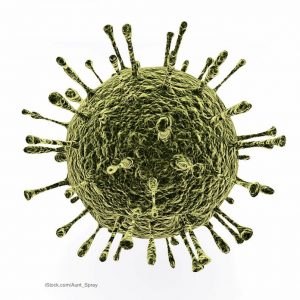A new study published in the International Journal of Food Microbiology has found that pesticides reconstituted with contaminated water could be a source of norovirus in the food chain. Farmers use well water, lake water, and river water to produce fruits and vegetables. That water is used to dilute pesticides, which are applied to fields just before produce is harvested. This extends shelf life.
 Researchers looked at the levels of culturable norovirus in eight different pesticides, right after dilution and after two hours. MNV-1, the murine norovirus, was found to remain infectious in seven of the eight pesticides. The scientists conclude that water containing norovirus could be an important source of the virus in fresh produce chains. The pesticides did not kill norovirus.
Researchers looked at the levels of culturable norovirus in eight different pesticides, right after dilution and after two hours. MNV-1, the murine norovirus, was found to remain infectious in seven of the eight pesticides. The scientists conclude that water containing norovirus could be an important source of the virus in fresh produce chains. The pesticides did not kill norovirus.
The researchers stated, “the application of pesticides may therefore not only be a chemical hazard, but also a microbiological hazard for public health.” They say that adding antiviral substances to reconstituted pesticides may be appropriate to reduce viral loads.
In another report, the European Food Safety Authority said that residues of pesticides are found on 97% of samples, although those residues fall within permitted limits. The FDA has found that 57.8% of domestically produced fruits and 25.4% of domestically produced vegetables had pesticide residues, again within limits set by the law. This is just one more reason to thoroughly wash fruits and vegetables before serving and eating them, although that is no guarantee that norovirus and pathogenic bacteria will be completely removed.




